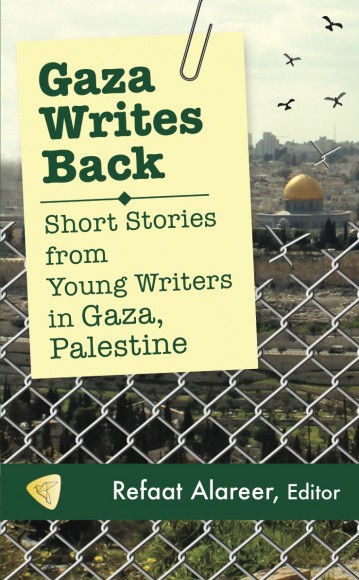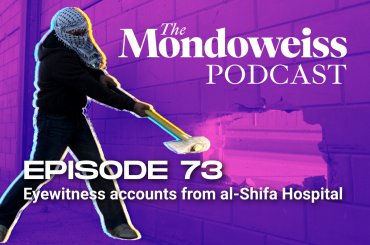Palestine is a martyr away, a tear away, a missile away, or a whimper away. Palestine is “a story away.” — Refaat Alareer, editor’s introduction Gaza Writes Back, Short stories from Young Writers in Gaza, Palestine

Helena Cobban publishes important voices from Palestine, and Gaza Writes Back, Short stories from Young Writers in Gaza, Palestine, is filled with them.
Edited by Refaat Alareer, the book is a collection of fiction radical in its purview, stories written in English unfiltered and unadulterated by translation, by 15 young Gazan writers commemorating the 5th anniversary of Israel’s 23-day military assault on Gaza known as the Gaza Massacre, or more formally, “Operation Cast Lead”.
A few words about my first awareness of these voices and why it excites me to introduce this volume of fiction. In the winter of 2010, Adam asked Gazan writer Mohammed Suliman if he would write a post for us about the two-year anniversary of that attack on Gaza in the winter of 2008/09. Adam asked about other English-language bloggers in Gaza, and Suliman led Adam to create the series Gaza Two Years Later.
That series was the first time I can recall ever reading any fiction by young Gazan writers. The power and courage of the writing profoundly changed my perceptions. People I once perceived as foreigners in many respects became my teachers and in some instances close friends. I wondered — (I was so naive)– how can they write so well, at such a young age, and not in their native tongue no less? How can they make me weep in a few paragraphs? Our astonishment led us quickly to wrap these essays into a writing competition we were (coincidentally) hosting at the time. Helena Cobban was one of the judges.
And then Yousef M. Aljamal, a writer himself, arranged a ceremony that was held in Gaza at the Center for Political and Development Studies [CPDS], a non-profit facilitating Palestinians representing themselves, to honor the students whose work was awarded on this site. Yousef began sending along writings of other young Gazans, and it dawned on me there was some kind of movement going on much bigger than what we’d imagined. This was a strong form of resistance that caught me by surprise.
At the heart of my awakening was the electrifying online portal of an English literature class at the Islamic University in Gaza, taught by Refaat Alareer, the editor of this volume. Alareer teaches world literature, comparative literature, and creative writing at IUG. Stumbling across this portal, I began to grasp the centrality of Alareer’s influence on this important narrative resistance movement from Gaza.
Enter Cobban, publisher of Just World Books, coincidentally the publisher of Laila El-Haddad, one of the authors who helped assemble the writers for the Gaza Two Years Later series. We introduced Cobban, now familiar with some of the writers, to Yousef and CPDS, and they organized an event on one of Helena’s trips to the Strip. She advised the young writers: “One of the most powerful things is to have public voice. It’s stronger than weapons, because it allows you to talk to other people.”
Last year in conversation with Helena about the literature emerging from young Gazan writers I inquired if she had met or heard of Refaat Alareer, the lecturer at IUG and the instructor of so many young writers in Gaza. After all, it just seemed like the perfect fit for Just World Books, her publishing company– and indeed it was.
In his own words, Refaat Alareer:
Gaza Writes Back comes to resist Israel’s attempts to murder these emerging voices, to squander the suffering of the martyrs, to bleach the blood, to dam the tears, and to smother the screams. This book shows the world that despite Israel’s continuous attempts to kill steadfastness in us, Palestinians keep going on, never surrendering to pain or death and always seeing and seeking liberty and hope in the darkest of times. Gaza Writes Back provides conclusive evidence that telling stories is an act of life, that telling stories is resistance, and that telling stories shapes our memories.
The cumulative effect of these narratives on the reader is an indelible impression of the defiant creative will to preserve and persevere.
Contributing Writers: Wafaa Abu Al-Qomboz, Refaat Alareer, Jehan Alfarra, Sarah Ali, Yousef Aljamal, Nour Al-Sousi, Shahd Awadallah, Nour El Borno, Sameeha Elwan, Hanan Habashi, Tasnim Hamouda, Elham Hilles, Aya Rabah, Mohammed Suliman, and Rawan Yaghi

The following is a brief excerpt from Scars by Aya Rabah, one of the stories in Gaza Writes Back. Not an easy choice, given that each story in this volume is fantastic. None the less, one tantalizing sample:
That wheat field behind our house is still shining with old, tired memories. The only thing that has changed is my way of seeing it.
“It is the land of battles,” I pointed to Hayat, the first time I went there again. For ages, I could not face the terrible fact of being the only survivor of a horrible massacre.
It was one o’clock in the morning. The air’s loose strings were circling me like ghosts. I asked my mother, “If something bad happens to us, what should I do?”
“Escape, sweetheart.” “Where?” “To God, to God’s heavens, darling.” I smiled. My mother’s words seemed to be taken from a sacred book.
She was the one who escaped, not me. She escaped with the winter’s wind, like the falling leaves of autumn.
My mother was like a holy figure standing in the shadow of God’s throne whenever she picked lavender from our backyard. And because I was afraid of them—of the invader of our land—she always reminded me, “The more morals die inside a human being, the more crimes he will be able to commit.” I thought I forgot that. Yet, strangely, when things happen, especially bad things, I immediately recall past advice, wisdom, or warning.
When I was awakened at the hospital, I did not need any clues to feel the change that happened to me. I turned to the nurse and asked her, “Are you real?”
“Do not worry. You are at hospital. You are not severely injured. It’s okay.”
Gaza Writes Back is available for pre-order and will be released in early January, 2014. Cobban has set up three book-launching events next month. One in London at P21 Gallery on Jan. 15th, featuring Rawan Yaghi; a worldwide Google Hangout, organized by the American Friends Service Committee (AFSC) on Jan. 16th; and an event in Kuala Lumpur Jan 18th, featuring Refaat Alareer and Yousef Aljamal.
I want one in my neighborhood!


The talent of Gaza’s writers is incredibly humbling… I can’t wait to read this, and hope to meet some of these amazing writers in person some day.
Thank you Annie for spreading the word!
Narrative is power.
Yousef
“I want one in my neighborhood!”
How about one in Nazareth? Or at least in New York this spring? I want to be there.
Thank you Annie for everything, and for this beautiful report.
Annie: Huge thanks for this! As Refaat says in the book’s Acknowledgments page, your contribution to the project was enormous!!
By the way, everyone should know that the excerpt Annie used above was used by permission. Anyone else seeking to use substantial xcerpts from the book should get prior written permission from JWB, as the managers of the copyright for the work.
Dr. Hatim and other friends– one thing we’re planning with some good friends, for January 16th, is a worldwide Google Hangout that will involve Refaat Alareer, some of the writers who are currently outside and (power situation permitting) inside the Gaza Strip, and people who want to join a discussion about the book from around the world! Stay tuned for more details about this!
One thing we’re currently trying to figure is: What is the best time of day for this? Should we optimize it for participants in the Middle East, the USA east coast, USA west coast, or East Asia (where Refaat currently is)? Any input on this would be much welcomed.
Another thing we’re thinking is it would be great for people to have little “Google Hangout Parties” in their homes, in cafes, or in other meeting spots, so they can participate as a group in this great discussion, rather than everyone just looking into her/his own computer… As I said, stay tuned, especially via the Just World Books Facebook page and the book’s own rapidly developing website.